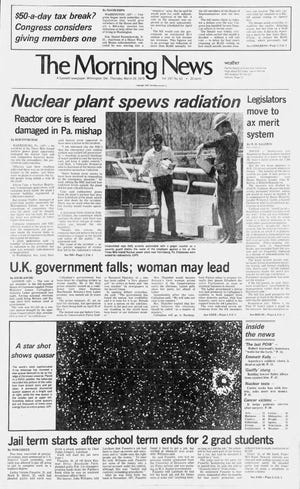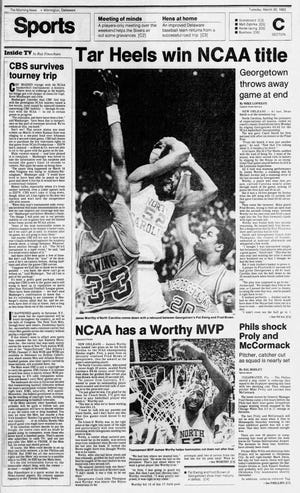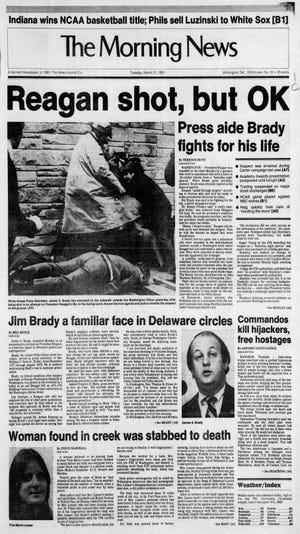“Pages of history” features excerpts from The News Journal archives including the Wilmington Morning News and the Evening Journal.
March 27, 1953, Wilmington Morning News
New polio vaccine passes test, but will be delayed
The new polio vaccine has passed its first human tests on 90 children and adults with flying colors. But “there will be no polio vaccine” for general use this summer.
This was announced last night by Dr. Jonas E. Salk, 38, young virus researcher of the University of Pittsburgh.
The creamy vaccine, homogenized in mineral oil, gave all 90 persons protective antibodies against all three types of virus which can cause human polio, he said. And it is perfectly safe.
The patients have kept this protection so far for six to eight weeks – they were vaccinated only that long ago…..
But 90 persons is too small a number to say that the vaccine will actually work for everyone, Dr. Salk made clear. He indicated many more careful tests must be made on hundreds or thousands of people first….
Twenty years ago a vaccine was released prematurely, he said, and there were kickbacks, some cases of paralysis and deaths after vaccinations because not enough was then known about the tricky polio virus….
“We want to reach our goal as quickly as possible, but this cannot be done in one day. It will be achieved if we move cautiously and with understanding step by step,” Salk said….
Statistics show that one child of every 150 develops paralytic polio throughout their lifetime.
Salk’s announcement was one of great drama about the most promising vaccine yet to appear. It represents the culmination of years of work by hundreds of scientists and $18,000,000 in March of Dimes funds….
Recent health news:The COVID emergency is set to end in May. What does it mean to Delaware?
March 29, 1979, The Morning News
Nuclear plant spews radiation in Pa. mishap
An accident at the Three Mile Island nuclear power plant apparently damaged the reactor core and sent radioactive material beaming into the atmosphere, the government said yesterday.
Officials said their readings indicated there was no immediate danger to the public, and there were no plans to evacuate the 15,000 people living within a mile of the plant.

Edison Case, a Nuclear Regulatory Commission spokesman, said radiation levels inside the plant’s reactor building registered at 1,000 times normal. But George Troffer, manager of generation quality assurance for Metropolitan Edison, one of the consortium of companies that runs the plant, said he thought that figure was too high. He said the level was perhaps 10 times higher than normal….
In Washington, Sen. Gary Hart said human error appeared to have been a factor in the incident. Hart, a Colorado Democrat, is chairman of the Senate subcommittee on nuclear radiation.
“I am informed [by the NRC] that the emergency core cooling system was turned off prematurely – resulting in partial blockage of water needed to cool the nuclear core and keep it under control,” he said….
A statement from General Public Utilities, the consortium which operates the plant, said there was “some low-level release of radioactive gas beyond the site boundary…”
“Despite this release, the company does not believe the level constitutes a danger to the health and safety of the public,” the statement said….
More recent news on nuclear power:A nuclear submarine bearing Delaware’s name has arrived in Wilmington’s port. What to know
March 30, 1982, The Morning News
Jordan’s shot lifts Tar Heels to NCAA title
At last, Dean Smith is at the mountain top.
North Carolina, battling the pressure of expectations all season, ended its coach’s classic frustrations Monday by edging Georgetown 63-62 for the NCAA basketball championship….
But it was a 16-foot jumper by freshman Michael Jordan from the left wing with 15 seconds left that gave Carolina its final one-point advantage.

Then came the turnover. Hoya guard Fred Brown, trying to find an open man with the seconds ticking away, mistook Carolina’s James Worthy for his own man and fired a pass right into the Tar Heel’s hands with eight seconds left….
Catch up on history:The News Journal archives, week of Jan. 2
March 31, 1981, The Morning News
Reagan shot, but OK; Press secretary Brady fights for his life
President Reagan was wounded in the chest Monday by a gunman who tried to assassinate him with a burst of .22-caliber bullets from a “Saturday night special.” White House press secretary James S. Brady was critically injured in the blaze of gunfire.
Reagan “sailed through surgery” according to doctors who said he’d be ready to make presidential decisions by today. But Brady was said to be fighting for his life after a bullet through his brain….

A Secret Service agent and a policeman also were wounded outside a Washington hotel where Reagan had just addressed a union convention. They were reported in serious condition but apparently not in danger.
A youthful, sandy-haired gunman from suburban Denver was wrestled into handcuffs and arrested moments after the gunman leveled his pistol at the president and fired six times from near point-black range. The Secret Service identified him as John Warnock Hinckley, 25, of Evergreen, Colorado.
There was no known motive….
In Evergreen, Hinckley family attorney Jim Robinson said in a statement from the suspect’s parents that young Hinckley has been under recent psychiatric care.
“His evaluation did not alert anyone to the seriousness of his condition,” the statement said….
Reach reporter Ben Mace at rmace@gannett.com.